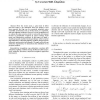Free Online Productivity Tools
i2Speak
i2Symbol
i2OCR
iTex2Img
iWeb2Print
iWeb2Shot
i2Type
iPdf2Split
iPdf2Merge
i2Bopomofo
i2Arabic
i2Style
i2Image
i2PDF
iLatex2Rtf
Sci2ools
121
click to vote
ICPR
2010
IEEE
2010
IEEE
Perceived Age Estimation under Lighting Condition Change by Covariate Shift Adaptation
—Over the recent years, a great deal of effort has been made to age estimation from face images. It has been reported that age can be accurately estimated under controlled environment such as frontal faces, no expression, and static lighting conditions. However, it is not straightforward to achieve the same accuracy level in real-world environment because of considerable variations in camera settings, facial poses, and illumination conditions. In this paper, we apply a recently-proposed machine learning technique called covariate shift adaptation to alleviating lighting condition change between laboratory and practical environment. Through real-world age estimation experiments, we demonstrate the usefulness of our proposed method. Keywords-face recognition; age estimation; covariate shift adaptation; lighting condition change; Kullback-Leibler importance estimation procedure; importance-weighted regularized least-squares
| Added | 20 Aug 2010 |
| Updated | 20 Aug 2010 |
| Type | Conference |
| Year | 2010 |
| Where | ICPR |
| Authors | Kazuya Ueki, Masashi Sugiyama, Yasuyuki Ihara |
Comments (0)

